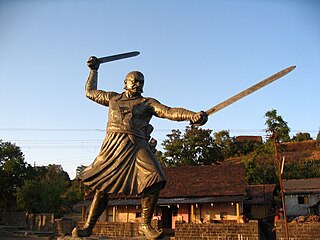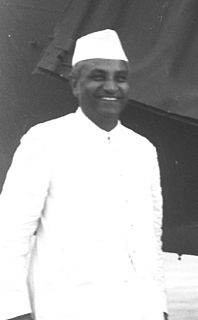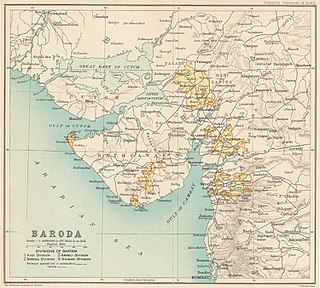Related Research Articles
The Maratha caste are a Marathi clan originally formed in the earlier centuries from the amalgamation of families from the peasant (Kunbi), shepherd (Dhangar), pastoral (Gavli), blacksmith (Lohar), carpenter (Sutar), Bhandari, Thakar and Koli castes in Maharashtra. Many of them took to military service in the 16th century for the Deccan sultanates or the Mughals. Later in the 17th and 18th centuries, they served in the armies of the Maratha empire, founded by Shivaji, a Maratha by caste. Many Marathas were granted hereditary fiefs by the Sultanates, and Mughals for their service.

Baji Prabhu Deshpande was a commander of Maratha king Shivaji, the founder of the Maratha empire. The legend of Baji Prabhu is linked with an important rear guard battle enabling Chhatrapati Shivaji's escape from Panhala fort; he was the hero who sacrificed his life for his king.

Pathare Prabhu is one of the Hindu communities in the city of Mumbai.

Bhalchandra Trimbak Ranadive, popularly known as BTR, was an Indian communist politician and trade union leader.
Kulkarni, is a family name native to the Indian state of Maharashtra and Northern Karnataka.The name "Kulkarni" is a combination of two words. Kula means "family", and Karanika means "archivist". Traditionally, Kulkarni was a title used by people who maintained the accounts and records of the villages that were used in collecting taxes. The title of the Kulkarni was later replaced by the Talathi. The Pargana and Kulkarni watans were abolished in 1950.

Kayastha denotes a cluster of disparate Indian communities broadly categorised by the regions of the Indian subcontinent in which they were traditionally located—the Chitraguptavanshi Kayasthas of North India, the Chandraseniya Kayastha Prabhus of Maharashtra and the Bengali Kayasthas of Bengal. All three were traditionally considered "writing castes", who had historically served the ruling powers as administrators, ministers and record-keepers.
Chandraseniya Kayastha Prabhu (CKP) is an ethno-religious caste of South Asia. Traditionally, the CKPs have the upanayana and have been granted the rights to study the vedas and perform vedic rituals along with the Brahmins. Ritually ranked very high, the caste may be considered socially proximate to the Maharashtrian Brahmin community. They have traditionally been an elite and literate but a numerically small community.
Kotnis is the surname found in multiple communities in Maharashtra. It can belong to the Deshastha Brahmin of Madhwa Sect., Saraswats or Chandraseniya Kayastha Prabhu(CKP).

General Arunkumar Shridhar VaidyaPVSM, MVC & Bar, AVSM, ADC was a General Officer in the Indian Army. He served as the 13th Chief of the Army Staff from 1983 to 1986. Following his retirement, he was assassinated by Harjinder Singh Jinda and Sukhdev Singh Sukha, Sikh militants of the Khalistan Commando Force in August 1986. This was done in vengeance of Operation Blue Star. General Arun Vaidya commanded this operation.
Bendre is an Indian surname native to the state of Maharashtra, Madhya Pradesh and Goa. Typically it is found in the Marathi Chandraseniya Kayastha Prabhu (CKP), Chitpavan Brahmin and Deshastha Rigvedi Brahmin (DRB) communities.
Ahmed Hussain A. Kazi Tamgha-e-Pakistan Award was a civil servant of Pakistan and senior advocate of the Pakistan Supreme Court, who shaped the internal revenue, economic and industrialization policies during the 1970s.
Ambashtha or Ambastha may refer to an ancient Indian tribe or several communities of Hindus in present-day India and Sri Lanka. In South India Ambastha may be rendered as Ambattan or Ambattar. They have traditionally been associated with Indian medicine and the profession of physician.

Jivraj Narayan Mehta was an Indian politician and the first Chief Minister of Gujarat. He also served as the first "Dewan" of the erstwhile Baroda state, and Indian high commissioner to the United Kingdom from 1963 to 1966.

Keshav Sitaram Thackeray, was an Indian social reformer. He campaigned against superstitions, untouchability, child marriage and dowry. He was also a prolific author.
Vaidya, is a Sanskrit word meaning "doctor" or "traditional physician" versed in Ayurveda medicine. It was and is used generally in India to refer to a person who practises ayurveda, an indigenous Indian system of medicine. Senior practitioners or teachers were called Vaidyarāja ("physician-king") as a mark of respect. Some practitioners who had complete knowledge of the texts and were excellent at their practices were known as Pranaacharya. Some royal families in India had a personal vaidya in attendance and these people were referred to as Rāja Vaidya.

Baroda State was a state in present-day Gujarat, ruled by the Gaekwad dynasty of the Maratha Confederacy from its formation in 1721 until its accession to the newly formed Dominion of India in 1949. With the city of Baroda (Vadodara) as its capital, during the British Raj its relations with the British were managed by the Baroda Residency. The revenue of the state in 1901 was Rs. 13,661,000. Baroda formally acceded to the Dominion of India, on 1 May 1949, prior to which an interim government was formed in the state.

Rai Sahib / Rao Saheb / Roy Sahib / Rao Sahib abbreviated R.S., was a title of honour issued during the era of British rule in India to individuals who performed faithful service or acts of public welfare to the nation. From 1911 the title was accompanied by a special Title Badge. Translated, Rai means "King" sahib means "leader".
Lakshman Jagannath Vaidya was the Dewan Bahadur of Baroda. He was the brother of Narayan Jagannath Vaidya. He belonged to the CKP community of Maharashtra. He also started a scholarship for the CKP students in 1887.

Bhalchandra Vaidya, also known as Bhai Vaidya, was an Indian politician who served as the Home Minister of the Indian state of Maharashtra, a revolutionary, Member of Legislative Assembly of the state of Maharashtra, Mayor of Pune city, veteran Socialist leader and head of the Socialist Party of India.
The Prabhu communities are a group of distinct Hindu castes found in Maharashtra, India. There are four such castes, all having different ritual and social status within the caste system of Maharashtra. They are Chandraseniya Kayastha Prabhu, Pathare Prabhu, Kanchole Prabhus and the Danved Prabhu.
References
- ↑ Professor Dr.Mrudula Verma; Professor Dr.Sarjerao Bhamare; Professor Shripad Nandedkar; Dr.Mokashi (RK Taleja College) (2015). Sanshodhak. Historian V.K.Rajwade Research center(mandal), Dhule, India. p. 1–14.
quote on page 1; Not much information is available about the early life of Narayan Jagannatha Vaidya. Narayan Jagannatha Vaidya belonged to the Chandraseniya Kayastha Prabhu(CKP) community of Maharashtra. His brother was the Diwan of Baroda state
- ↑ The Bombay University Calendar, Volume 2. University of Bombay. 1925. p. 582.
Paper for the foundation of a Scholarship to be called " The Dewan Bahadur Lakshman Jagannath Vaidya Scholarship " and to be awarded to a Candidate of the Kayastha Prabhu community who passes the Matriculation Examination with the highest number..
- ↑ The Bombay University Calendar, Volume 1. 1908. p. 490.
LAKSHMAN. JAGANNATH. VAIDYA. SCHOLARSHIP. The Secretary to the Kayastha Prabhu Educational Fund, Baroda, in a letter dated 2nd February 1887, offered to the University a sum of Rs. 5,000 in Government 4 per cent. Paper for the foundation of a Scholarship to be called " The Dewan Bahadur Lakshman Jagannath Vaidya Scholarship " and to be awarded to a Candidate of the Kayastha Prabhu community who passes the Matriculation Examination with the highest number
- ↑ J.D.Ranadive (1978). Shri Narayan Jagannatha Vaidya in Amrut. p. 123–125.